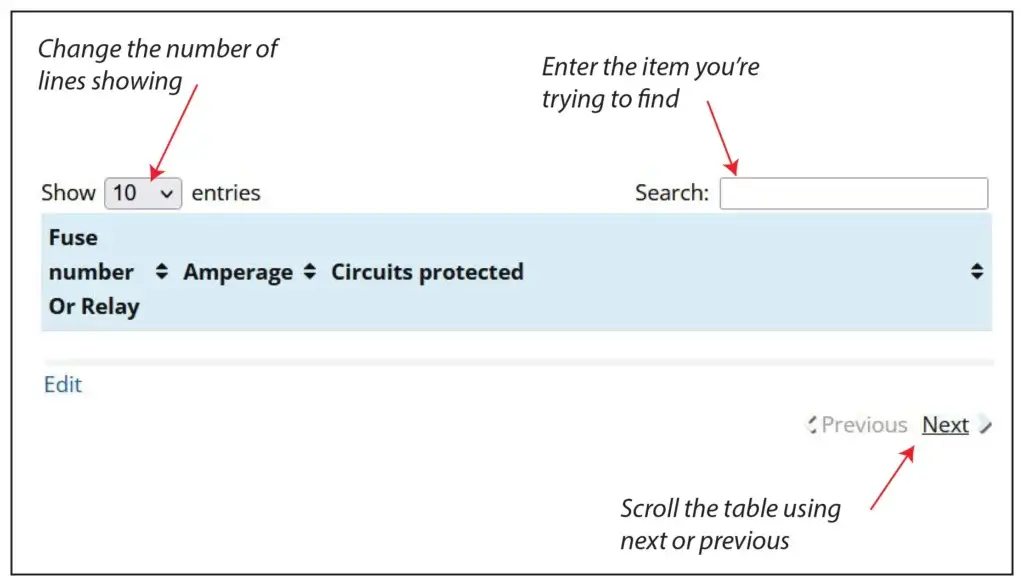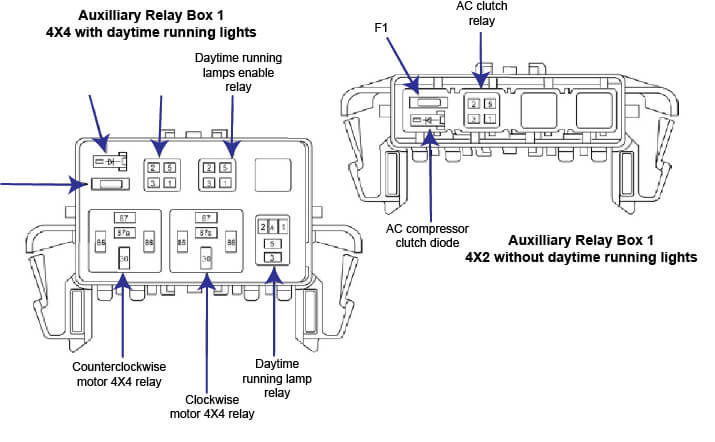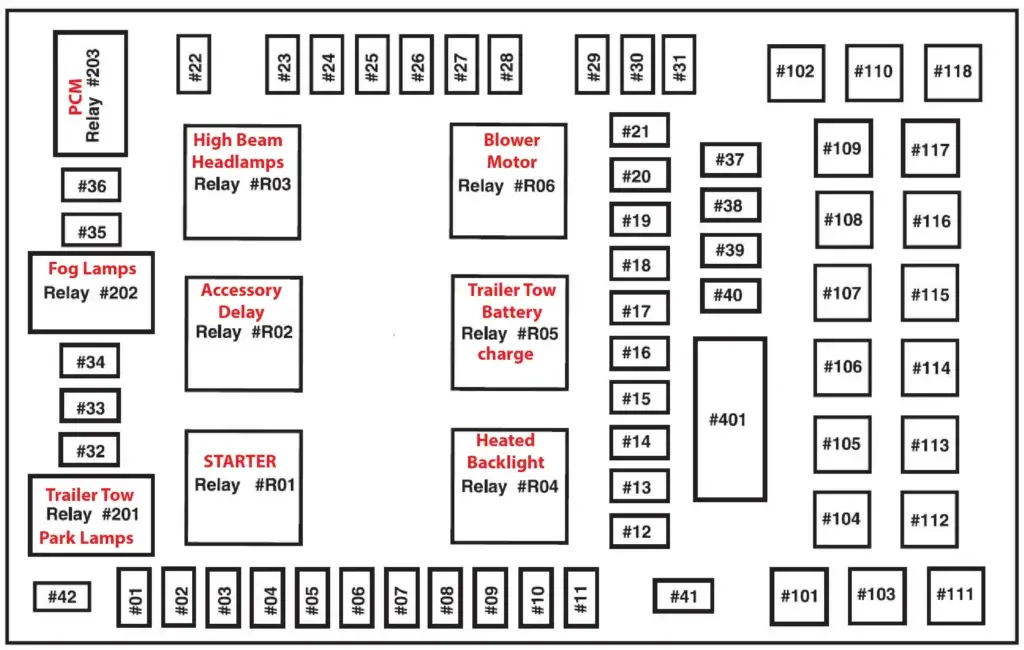2007 F150 Fuse Box Diagram: Exploring the Fuse Boxes
2007 F150 Fuse Box Diagram: Find the correct fuse for the circuit you’re working on
This article shows you the 2007 F150 Fuse Box Diagram for the Passenger Compartment Fuse Box, also called the Power Distribution Box or the Central Junction Box. In your 2007 Ford F150, the electrical system is designed with a primary fuse box and an auxiliary relay box. The Passenger Compartment Fuse Box, Power Distribution Box, or Central Junction Box, is located under the dashboard on the passenger side. To access this fuse box, you’ll need to crawl under the dash and locate the trim panel and fuse box cover concealed in the footwell area.
To get to it, remove the trim panel to expose the fuse box. Then, locate the pull tab on the fuse box cover and pull it off to access the fuses. Once you’ve completed your task, reinstall the cover by aligning the top part of the cover with the fuse box. The push the bottom part upwards until you hear a click, indicating it’s securely in place.
Your vehicle also has an auxiliary relay box situated in the engine compartment, specifically on the driver’s side fender. This secondary box is designed to house additional relays and components related to the electrical system.
To learn more about automotive fuses, see this article
To learn how to check a fuse visually or without removing it, see this article
Find the most commonly replaced fuses and bulbs here
The fuse box diagram and table below show all 71 fuses and all the relays. But most DIYers are looking for fuses and relays for the lights, power ports, and the blower motor. I’ve listed the most commonly checked/replaced fuses here to save time. I’ve also listed the most commonly replaced bulbs. A blown fuse or bulb are the two most common reasons for lighting issues
• Backup Light: Fuse #14 10A, Bulb #3156
• Blower Motor: Fuse #116 30A and #13 10A
• Headlight Low Beam Passenger Side: Fuse #23 10A, Bulb #H13 (dual filament for high and low beams)
• Headlight Low Beam Driver’s Side: Fuse #25 10A, Bulb #H13 (dual filament for high and low beams)
• Headlights High Beam: Fuse #35 20A, Bulb #H13 (dual filament for high and low beams)
• Horn: Fuse #26 20A
• Parking lamps: Fuse #6 15A Mini Fuse, Front park turn bulb #3157A (amber)
• Power Ports: Rear: Fuse #37 20A, Instrument Panel: Fuse #39 20A, Cigar Lighter #41 20A, Overhead #18 10A
• Stop and Turn lights: Fuse #2 20A Mini Fuse, Bulb #4057 or #3057
2007 F150 Fuse Box Diagram passenger compartment fuse box/Cabin Fuse Box/Central Junction Box/Power Distribution Box
The passenger compartment fuse box is under the dash on the instrument panel’s right-hand (passenger) side. Remove the trim panel and fuse box cover to access the fuses. To remove the fuse box cover, place a finger behind the PULL tab and your thumb above the PULL tab. Then, pull the cover off.
How to find your fuse and the devices served by that fuse
There are 71 fuse and relay slots in the Cabin Power Distribution Box. The chart shows only 10 to speed up load time. Here’s how to find the fuse and circuit you want.
1) Change the number of entries showing (in the Show Entries Box) to 100 and scroll the list.
2) Enter the name of the component you’re searching for in the Search box.
3) Use the Next/Previous buttons at the bottom of the table

| Fuse number | Amperage | Circuits protected |
|---|---|---|
| F1 | 10 | Windshield wiper motor, Instrument cluster, Audio unit for XL/STX |
| F2 | 20 | Indicator flasher relay, Brake pedal position switch, stop/turn lamps |
| F3 | 7.5 | Exterior rear view mirror switch, Seat adjust switch, driver side front, Driver seat module |
| F4 | 10 | DVD player, Power folding mirror module |
| F5 | 7.5 | Powertrain Control Module (PCM), Autolamp/sunload sensor, Electronic Manual Temperature control (EMTC) module, Electronic Automatic Temperature Control (EATC) module |
| F6 | 15 | Parklamps, BSM, Instrument panel illumination |
| F7 | 5 | Radio (start signal) |
| F8 | 10 | Heated mirrors, Switch indicator |
| F9 | 20 | Fuel pump relay, Fuel injectors, Intake manifold runner control (4.2L) |
| F10 | 20 | Trailer tow relay, parking lamp, Trailer tow relay, reversing lamp, R201 |
| F11 | 10 | A/C clutch relay, Integrated wheel ends solenoid |
| F12 | 5 | PCM power relay |
| F13 | 10 | Electronic Manual Temperature Control (EMTC) module, Electronic Automatic Temperature Control (EATC) module, Indicator flasher relay |
| F14 | 10 | Back-up lamp and Daytime Running Lamps (DRL) relay coil, A/C pressure switch, Redundant speed control switch, Heated PCV (5.4L), Trailer tow back-up lamps relay coil, ABS, Reverse park aid, EC mirror, Navigation radio (reverse input) |
| F15 | 5 | Floor shifter, Overdrive cancel switch, Instrument cluster, Traction control switch |
| F16 | 10 | Brake pedal position switch/ Brake-shift interlock solenoid |
| F17 | 15 | Fog lamp relay |
| F18 | 10 | Parking Aid Module (PAM), Electronic compass, Electrochromatic inside mirror unit, Heated seat module, driver side front, Heated seat module, passenger side front, Body security module, Auxiliary power point |
| F19 | 10 | Passenger Air Bag Deactivation (PAD) switch, Seat weight sensor module, Restraints control module |
| F20 | 10 | Auxiliary power point |
| F21 | 15 | Instrument cluster |
| F22 | 10 | Audio unit, Roof opening panel switch, Door lock switch, passenger side, Door lock switch, driver side |
| F23 | 10 | Headlamp, right |
| F24 | 15 | Battery saver relay |
| F25 | 10 | Headlamp, left |
| F26 | 20 | Horn relay |
| F27 | 5 | Passenger Air bag Deactivation (PAD) indicator, Instrument cluster |
| F28 | 5 | SecuriLock transceiver (PATS), PCM IGN monitor |
| F29 | 15 | PCM 4x4 power |
| F30 | 15 | PCM 4x4 power |
| F31 | 20 | Radio power |
| F32 | 15 | EVAP canister purge valve, A/C clutch relay, Charge Motion Control Valve (CMCV), Valve cover assembly, left, Heated Oxygen Sensor (HO2S)#11, Heated Oxygen Sensor (HO2S) #21, Manifold Absolute Pressure/Intake Air Temperature (MAP/IAT) sensor, Positive crankcase ventilation heater, EGR system module, Variable Camshaft Timing (VCT) valve 1, Variable camshaft Timing (VCT) valve 2, Intake manifold Tuning Valve (IMTV), Camshaft position sensor |
| F33 | 15 | Shift solenoid, CMS #12 and #22, Ignition coils |
| F34 | 20 | PCM power |
| F35 | 10 | Instrument cluster high beam indicator, High beam headlamps |
| F36 | 20 | Trailer tow right turn/stop lamps |
| F37 | 20 | Rear power point, Center console power point |
| F38 | 25 | Subwoofer |
| F39 | — | Not used |
| F40 | 20 | Daytime Running Lamps (DRL) enable relay, Low beam headlamps, DRL |
| F41 | — | Not used |
| F42 | 10 | Trailer tow connector, Park/stop/turn lamp, left rear, Multifunction switch |
| F101 | 30 | Starter solenoid |
| F102 | 20 | Ignition switch |
| F103 | 20 | ABS control module |
| F104 | — | Not used |
| F105 | 30 | Trailer electronic brake control module |
| F106 | 30 | Trailer tow relay, battery charge |
| F107 | 30 | Power door locks Body security module (BSM) |
| F108 | 30 | Seat adjust switch, passenger side front |
| F109 | 30 | Adjustable pedal switch, Seat adjust switch, driver side front, Driver seat module |
| F110 | 20 | Cigar lighter, Diagnostic connector power |
| F111 | 30 | Clockwise (CW) motor 4x4 relay, Counterclockwise (CCW) motor 4x4 relay |
| F112 | 40 | ABS control module |
| F113 | 30 | Windshield wiper motor and washer pump |
| F114 | 40 | Heated backlite, Heated mirror power |
| F115 | — | Not used |
| F116 | 30 | Front blower motor relay |
| F117 | 20 | Instrument panel power point |
| F118 | 30 | Heated seat module, driver side front, Heated seat module, passenger side front |
| F401 | 30 Circuit Breaker | Power sliding window switch, rear, Roof opening panel module, Master window adjust switch, Window adjust switch, passenger side |
| R01 | Full ISO relay | Starter solenoid |
| R02 | Full ISO relay | Accessory delay |
| R03 | Full ISO relay | Hi-beam headlamps |
| R04 | Full ISO relay | Heated backlite |
| R05 | Full ISO relay | Trailer tow battery charge |
| R06 | Full ISO relay | Blower motor |
| R201 | Half ISO relay | Trailer tow park lamps |
| R202 | Half ISO relay | Fog lamps |
| R203 | Half ISO relay | PCM |
2007 F150 Auxiliary Relay Box

2007 Ford F150 Aux Relay Box Relay Diagram
Tips to diagnose electrical issues on your 2005 F150
If your power windows don’t work
• The power windows don’t use fuses. They get power from a 30A circuit breaker #401 in the fuse box diagram above.
If your blower motor doesn’t work
The blower motor gets its power from the blower motor relay #R06 in the fuse box diagram above. Power comes into the motor on the brown/yellow wire. It seeks ground through the brown/white wire, which runs to the fan speed switch and then to ground #203, located in the passenger footwell.
If the circuit you’re working on contains a relay
• A simple way to test a relay is to swap in a similarly shaped relay and see if the component works.
• If that doesn’t work, remove the relay and test for power to the relay control coil and contacts using a multimeter. For more information on relay testing, see this article.
©, 2024 Rick Muscoplat
Posted on by Rick Muscoplat
